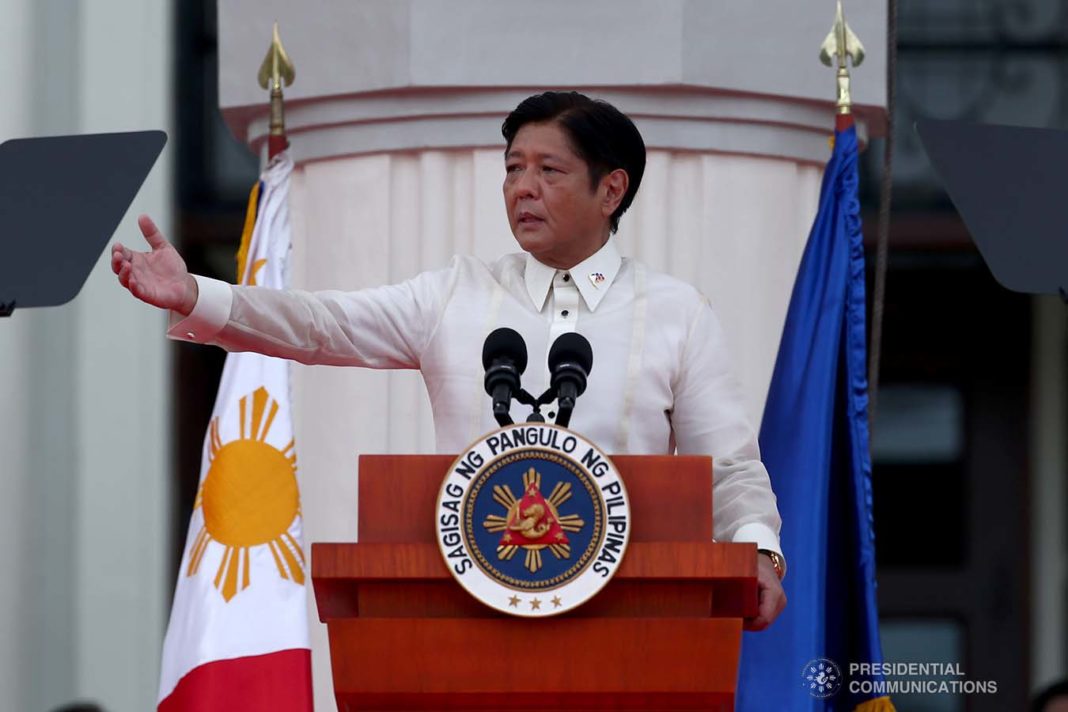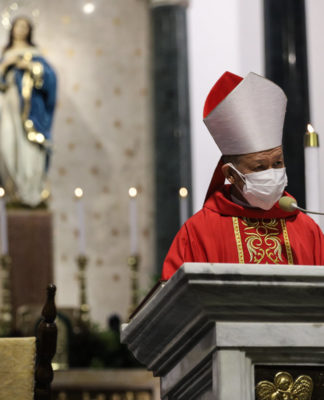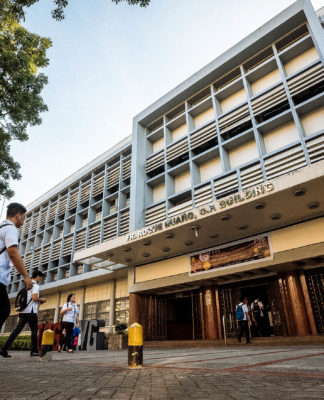A Marcos is back in Malacañang 36 years after the EDSA Revolution that ousted the late Philippine dictator Ferdinand Marcos Sr., the architect of the brutal martial law that killed and abused thousands of Filipinos
Ferdinand “Bongbong” Marcos Jr., the only son and namesake of the ousted dictator Ferdinand Sr., was inaugurated as the country’s 17th president on Thursday, June 30, bringing with him flowery but vague promises of better lives for Filipinos.
In his inaugural speech, Marcos Jr., 64, said he was ready to lead the country to a better tomorrow.
“The changes we seek will benefit all and will shortchange no one. I was not the instrument of change. You were that. You made it happen. I am now. You picked me to be your servant to enable changes to benefit all. I fully understand the gravity of the responsibility that you’ve put on my shoulders. I do not take it lightly, but I am ready for the task,” he said.
“We all want peace in our land. You and your children want a good chance at a better life in a safer, more prosperous country. All that is within reach of a hardworking, warm, and giving race. Your dreams are mine. Pangarap niyo ay pangarap ko,” he continued.
Marcos said through unity, the main message of his campaign, the Filipino people could overcome the disruptions caused by the pandemic.
“These are troubling times… Giving up is not an option. We’ve been through times of bitter division, but united, we came through to this when it shall begin again but better,” the president said.
Marcos Jr. won the 2022 presidential race after getting over 31.1 million votes for the first presidential election via majority. Sara Duterte-Carpio, Marcos Jr.’s running mate and daughter of newly stepped down president Rodrigo Duterte, also won the elections in a landslide with more than 32.2 million votes.
Marcos Jr. said he would continue Duterte’s “Build, Build, Build,” the previous administration’s trillion-peso infrastructure program.
“Investors are now setting up industries along the promising roads built, and yet the potential of this country is not exhausted. Following these giant steps, we will continue to build. I will complete on schedule the projects that have been started,” Marcos Jr. said.
“I am not interested in taking credit. I want to build on [the] success that’s already happening,” he added.
Of the program’s 119 flagship projects, 19 were completed before Duterte stepped down from office.
Marcos Jr.’s plans
During his inauguration, Marcos Jr. gave a glimpse of his plans for an all-inclusive economic transformation to address problems on food self-sufficiency, Covid-19 response and healthcare system, education and climate change.
He said he would lay down the specifics of his plans during his first State of the Nation Address in July.
Marcos Jr. did not participate in most of the debates held for presidential candidates during the campaign period. He claimed he was absent from these programs to search for solutions to the country’s problems.
“I did not talk much in this campaign. I did not bother to think of rebutting my rivals. Instead, I searched for promising approaches better than the usual solutions. I listened to you. I did not lecture you, who has the biggest stake in our success,” Marcos Jr. said.
Marcos Jr., who will sit as secretary of the Department of Agriculture, said the government must pay urgent attention to the agriculture sector for the country to attain food self-sufficiency, which he said was the key promise of every administration.
“Food is not just a trade commodity. Without it, people weaken and die… Food sufficiency must get the preferential treatment the richest free trade countries always gave their agricultural sectors… I’m giving that policy the most serious thought if it doesn’t change or make more allowances for emergencies with long-term effects,” the president said.
Marcos Jr. also promised that the government would not be caught “unprepared, under-equipped and understaffed to fight the next pandemic” as he stated that there were shortcomings in the Covid-19 response of the previous administration. He vowed to “fix them out in the open.”
Marcos Jr., who appointed Duterte-Carpio as his education secretary, said the things taught in schools should be “rethought.”
“I am not talking about history. I’m talking about the basics, the sciences, sharpening theoretical aptitude and imparting vocational skills such as in the German example, alongside the national language with equal emphasis and facility in a global language, which we had and lost,” he said.
Ending his speech, Marcos Jr. acknowledged his debt of gratitude to the Filipinos and promised that he would spare them from additional burdens under his administration.
“With every difficult decision that I must make, I will keep foremost in my heart and in my mind the debt of gratitude I owe you for the honor and responsibility that you have conferred on me… I will try to spare you; you have your other responsibilities to carry. But I will not spare myself from shedding the last bead of sweat or giving the last ounce of courage and sacrifice.”
Marcos Jr. was a senator from 2010 to 2016.
He sought the vice presidency in the 2016 elections but lost to then-Camarines Sur Rep. Maria Leonor “Leni” Robredo by 263,473 votes.
This year, the country will mark the 50th year since the late dictator Marcos Sr. announced Martial Law, which was marked by abuses, corruption and human rights violations.
The UST Central Student Council changed its profile picture to a monochromatic version of its logo following Marcos Jr.’s inauguration, with the caption “#NeverAgain #NeverForget.” C.J. Paras


















